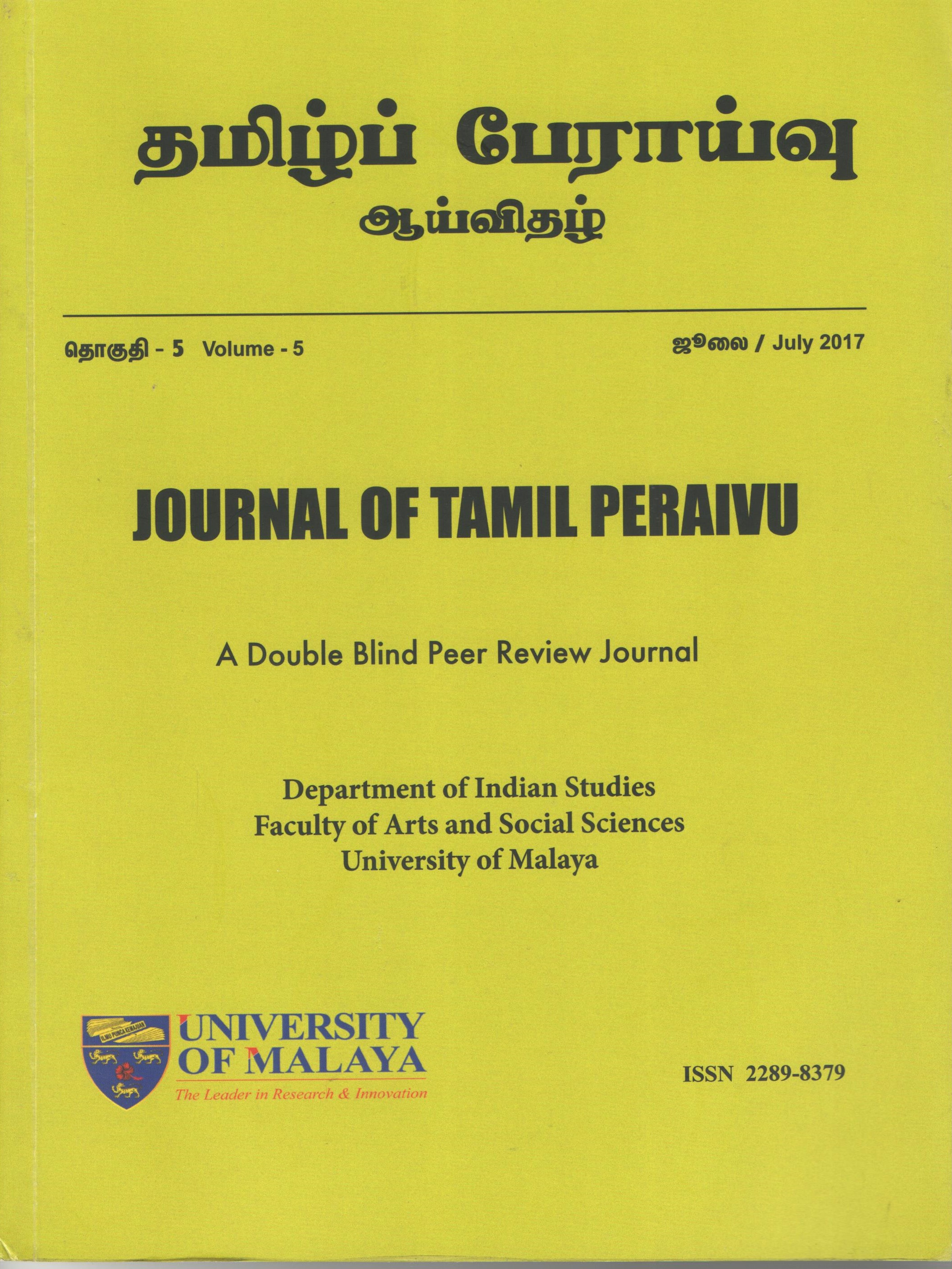தமிழ்மொழி கற்றல் கற்பித்தலில் நவீன முறைகளும் கலைச் செயல்பாடுகளின் பயன்பாடும்.
The Utility of Art and Modern Methods in Learning and Teaching of Tamil
DOI:
https://doi.org/10.22452/JTP.vol5no1.7Abstract
Tamil is an ancient and tradition oriented language. It has many merits unlike other languages of the world. The learning of Tamil language has to be comprehensive and complete. The gurukula method has been transformed into learning in constructed buildings. The teaching of Tamil still follows conventional and traditional methods. In this the students are deprived of getting the knowledge through modern methods. So the researcher has taken 30 students as samples and asked them about the new techniques that could be adopted in teaching Tamil, in particular, through Art. This is called conducting an experimental research in a control group later in a experimental group. Then the results are recorded through a Pre-Test and Posttest methods. On a statistical study based on the marks from these tests, it is observed that Tamil could be taught more effectively through fine arts a transformation in teaching and learning Tamil.
Key Words:
Tamil language, teaching through music, teaching through drawing, teaching through drama, fine arts
ஆய்வுச் சுருக்கம்:
தமிழ்மொழி மிகவும் பழமையான பாரம்பரியம் மிக்க தொன்மையான ஒரு மொழியாகும். உலக மொழிகளுக்கெல்லாம் இல்லாத சிறப்பு நம் தாய் மொழியாம் தமிழுக்கு உண்டு. ஒருவன் முழுமையான கல்வி பெற்று அறிஞனாகத் தாய்மொழிவழி கல்வி கற்பதே அவனுடைய படைப்பாற்றலை வளர்க்கும். வேத காலத்தில் குருகுலக் கல்வியாகக் கற்பிக்கப்பட்டு வந்த கல்வி முறை திண்ணைப்பள்ளி என மாறித் தற்போது முழுமையான ஒரு தனிக்கட்டிட அமைப்புப் பெற்று பள்ளிக்கூடமாக வடிவம் பெற்று விளங்குகின்றது. இன்றைய நவீனகால கட்டத்தில் தமிழ்மொழிக் கல்வி ஆசிரியர் மையக்கல்வியாகவே பழமையான முறையிலேயே அளிக்கப்படுகின்றது. மாணவர்களின் பங்களிப்பும், படைப்பாற்றல் வெளிப்பாடும் கேள்விக்குறியாகவே உள்ளது. இந்த நிலையை மாற்றி மாணவர்கள் தமிழ்மொழிக் கற்றல் செயலில் ஆர்வமோடு நவீனமுறையில் மொழிகற்கச் சில கலைச்செயல்பாட்டுப் பயிற்சி முறைகள் கையாளப்பட்டால் சிறப்பான தேர்ச்சி பெற்று மாணவர்கள் சிறந்த மொழிப் புலமைம் பெறுவர் என்ற நோக்கத்தோடும் தமிழ் மொழிக் கற்றல் கற்பித்தல் செயலை எளிமையாகவும் மாணவர்கள் விரும்பும் வகையிலும் செயல்பாடுத்தவும் இந்த ஆய்வு மேற்கொள்ளப்பட்டுள்ளது. எனது இந்த ஆய்வானது உயர்நிலைப்பள்ளி மாணவர்கள் 30 பேரிடம் பரிசோதனைமுறை ஆய்வாக (Experimental Research) மேற்கொள்ளப்பட்டுள்ளது. இம்முறையில் இருவேறு பள்ளி மாணவர்களைத் தேர்ந்தெடுத்து அவர்களில் ஒரு பிரிவைக் கட்டுப்படுத்தப்பட்ட குழுவாகவும் (Control Group) மற்றொரு பிரிவை பரிசோதனைக் குழுவாகவும் (Experimental Group) பிரிக்கப்பட்டு இதில் கட்டுப்படுத்தப்பட்ட குழுவுக்கு பொதுவான கற்பித்தல் முறையிலும், பரிசோதனைக் குழுவுக்கு நுண்கலை செயல்பாட்டின் வழி கற்பித்தும் பரிசோதிக்கப்பட்டது. இரண்டு மாதங்கள் கால அளவாக ஆய்விற்கு எடுத்துக்கொள்ளப்பட்டது. இந்தச் சோதனைக்கு முன் இரு குழுவிற்கும் முன்தேர்வு (Pre Test) வைக்கப்பட்டு அந்தத் தேர்வில் பெற்ற மதிப்பெண் மற்றும், (Post Test) பின் தேர்வு வைக்கப்பட்டு அந்தத் தேர்வு மதிப்பெண் இரண்டையும் புள்ளியியல் பகுப்பாய்வு செய்ததில் நுண்கலை செயல்பாட்டின் வழி மொழி கற்பிக்கப்பட்ட மாணவர்களின் கற்றல் அடைவு மேலோங்கி இருப்பது கண்டுபிடிக்கப்பட்டது. எனவே நுண்கலைகளின் வழி மொழிப்பயிற்சி அளிப்பது சிறந்த கற்றல் அடைவையும், பள்ளியின் தேர்ச்சி விழுக்காட்டையும் மாணவர்களிடையே சிறந்த நடத்தை மாற்றத்தையும் ஏற்படுத்தும் என்பது தெளிவாகியது.
குறிப்புச் சொற்கள்:
தமிழ்மொழி, கற்றல் கற்பித்தல், இசைக்கலை வழி கற்பித்தல், ஓவியக்கலை வழி கற்பித்தல், நாடகக்கலை வழி கற்பித்தல்.



